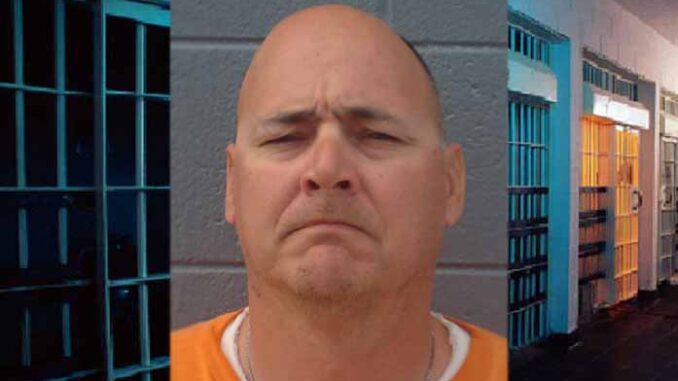
A onetime Army sergeant from Sierra Vista who is serving more than 220 years in prison for possessing a collection of child pornography and molesting a young girl in 2007 while recording the abuse will be the subject of a hearing in a Cochise County courtroom Tuesday in hopes of overturning his convictions.
Robert “Dale” Higgins filed a petition for post-conviction relief last year in which he is seeking access to certain information in an effort to demonstrate he is entitled to a new trial. Judge Terry Bannon will conduct a status conference Dec. 14 to address various pleadings filed by Higgins, his court-appointed attorney, and the Cochise County Attorney’s Office which opposes Higgins’ petition.
One issue for Bannon to address is which of the recent filings connected to Higgins’ petition for post-conviction relief she can or should act on, as some have been filed by Higgins and others by his court-appointed attorney. Normally a defendant can only be self-represented or represented by counsel, points out Deputy County Attorney Doyle Johnstun.
Higgins, now 48, was assigned to NETCOM at Fort Huachuca in October 2007 when he came under investigation after his then-girlfriend reported seeing a video on Higgins’ computer of Higgins sexually abusing a four-year-old female relative. A search warrant led to the discovery of more than 1,000 still images and 13 video files of child pornography on another computer belonging to Higgins.
The girlfriend later reported the matter to the Sierra Vista Police Department, and with the assistance of a detective she recorded a call in which she and Higgins discussed the video. Several of Higgins’ self-incriminating comments were played for jurors during a mid-2009 trial, although Higgins would later allege the recording had been altered.
The jury deliberated less than an hour before convicting Higgins of 19 felonies, The trial judge sentenced Higgins to consecutive prison terms for 18 of the counts, which totaled 227 years under Arizona’s Dangerous Crimes Against Children sentencing enhancement. Higgins must serve 226 of the years in custody.
“The Court has also considered the fact, based on what was presented to the Court, it is highly likely that this conduct didn’t occur just this one time,” then-Judge Wallace Hoggatt said at sentencing, adding that the young girl molested by Higgins “was severely victimized” by the abuse.
The Arizona Court of Appeals affirmed the convictions and lengthy sentences on direct appeal, and later denied review of a petition for post-conviction relief Higgins filed in 2011.
Last year Higgins initiated a second post-conviction effort. He has asked Bannon to issue a subpoena to the National Security Agency (NSA) and the U.S. Army Criminal Investigations Division (CID) for any of his phone records from October 2007.
Higgins is also seeking the analysis of a DVD recording made nearly 14 years ago when the young girl underwent a forensic interview about the sexual contact. It appears Higgins was not informed prior to trial that such an interview had been conducted with the victim in late 2007.
“The purpose of this analysis would be to inspect the DVD for compression, dubbing, missing frames, beaks in recording, or any other alteration that would compromise the integrity and verity of this recording,” Higgins wrote.
Higgins has also asked Bannon to order the transcription of the girl’s forensic interview, as Arizona Department of Corrections will not allow him to review the DVD. However, the Cochise County Attorney’s Office argues both of the defendant’s requests should be denied.
“Defendant has not made a prima facie showing that the DVD of the Victim’s forensic interview herein has been altered in any way,” Johnstun wrote to the judge. “Therefore, Defendant’s request for a forensic analyses of the DVD is nothing more than a ‘fishing expedition.’”
Johnstun also pointed out the girl in the video was never called to testify at trial nor at any hearings before or after Higgins’ convictions. “These facts significantly diminish the potential importance of the forensic interview DVD,” he argued.
One person who did testify at the jury trial was Higgins. He admitted on the stand to replacing the hard drive in the desktop computer which his girlfriend claimed contained the video of Higgins molesting a young girl.
The desktop computer and Higgins were found at a local hotel after he was confronted by the girlfriend regarding his conduct. The packaging for the new hard drive was also found in the hotel, but investigators never located the original hard drive.
Another of Higgins’ post-conviction arguments is that he could not be convicted of 14 counts of sexual exploitation of minors -the state statute covering child pornography- because the indictment failed to identify the victims by name. He has also argued the laptop on which a federal agent found illicit images was taken by Higgins to South Korea and was accessible by others at the time.
Johnstun, however, says there are serious flaws with Higgins’ arguments. And one of the biggest hurdles Higgins must clear is the fact he knew about the girl’s interview and the phone records issue before his appeal and his 2011 post-conviction relief filing, but has failed to explain why he waited nearly a decade to do so.
“In 2011, trial counsel for the State was still alive, Detective [Mertie] Stompro had not retired, and the memories of the parties and officers involved in the case were relatively fresh so as to be able to address this issue in a meaningful way,” Johnstun argues.
Court records show Higgins also turned to a federal court in an attempt to challenge his state convictions. His effort was denied in 2014.

